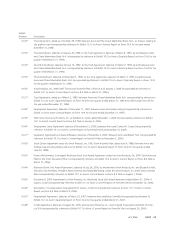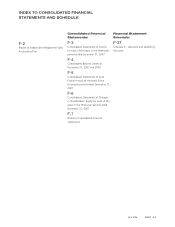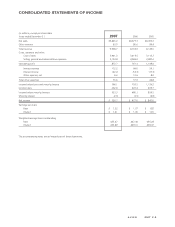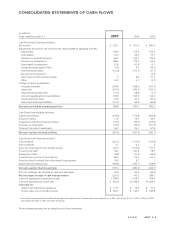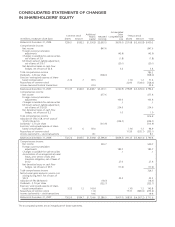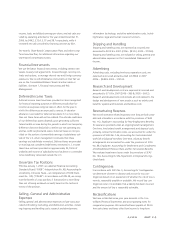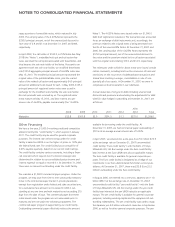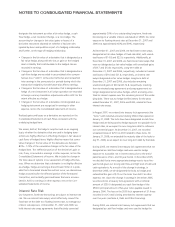Avon 2007 Annual Report Download - page 59
Download and view the complete annual report
Please find page 59 of the 2007 Avon annual report below. You can navigate through the pages in the report by either clicking on the pages listed below, or by using the keyword search tool below to find specific information within the annual report.NOTES TO CONSOLIDATED FINANCIAL STATEMENTS
(In millions, except per share and share data)
NOTE 1. Description of the Business
and Summary of Significant Accounting
Policies
Business
When used in these notes, the terms “Avon,” “Company,”
“we” or “us” mean Avon Products, Inc.
We are a global manufacturer and marketer of beauty and
related products. Our business is conducted worldwide primarily
in one channel, direct selling. We manage our operations based
on geographic operations and our reportable segments are
North America; Latin America; Western Europe, Middle East &
Africa; Central & Eastern Europe; Asia Pacific; and China. We
also centrally manage global Brand Marketing and Supply Chain
organizations.
Sales are made to the ultimate customers principally by
independent Avon Representatives. Product categories include
Beauty, which consists of cosmetics, fragrances, skin care and
toiletries; Beauty Plus, which consists of fashion jewelry,
watches, apparel and accessories; and Beyond Beauty, which
consists of home products and gift and decorative products.
Sales from Health and Wellness and mark. are included among
these three categories based on product type.
Principles of Consolidation
The consolidated financial statements include the accounts of
Avon and our majority and wholly-owned subsidiaries. Inter-
company balances and transactions are eliminated.
Use of Estimates
The preparation of financial statements in conformity with gen-
erally accepted accounting principles in the United States of
America requires us to make estimates and assumptions that
affect the reported amounts of assets and liabilities, the dis-
closure of contingent assets and liabilities at the date of the
financial statements and the reported amounts of revenues and
expenses during the reporting period. Actual results could differ
materially from those estimates and assumptions. On an ongoing
basis, we review our estimates, including those related to
restructuring reserves, allowances for doubtful accounts receiv-
able, allowances for sales returns, provisions for inventory obso-
lescence, income taxes and tax valuation reserves, share-based
compensation, loss contingencies, and the determination of
discount rate and other actuarial assumptions for pension, post-
retirement and postemployment benefit expenses.
Foreign Currency
Financial statements of foreign subsidiaries operating in other
than highly inflationary economies are translated at year-end
exchange rates for assets and liabilities and average exchange
rates during the year for income and expense accounts. The
resulting translation adjustments are recorded within accumu-
lated other comprehensive loss. Financial statements of sub-
sidiaries operating in highly inflationary economies are translated
using a combination of current and historical exchange rates and
any translation adjustments are included in current earnings.
Gains or losses resulting from foreign currency transactions are
recorded in other expense, net.
Revenue Recognition
Net sales primarily include sales generated as a result of Repre-
sentative orders less any discounts, taxes and other deductions.
We recognize revenue upon delivery, when both title and the
risks and rewards of ownership pass to the independent Repre-
sentatives, who are our customers. Our internal financial systems
accumulate revenues as orders are shipped to the Representa-
tive. Since we report revenue upon delivery, revenues recorded
in the financial system must be reduced for an estimate of the
financial impact of those orders shipped but not delivered at the
end of each reporting period. We use estimates in determining
the adjustments to revenue and operating profit for orders that
have been shipped but not delivered as of the end of the period.
These estimates are based on daily sales levels, delivery lead
times, gross margin and variable expenses. We also estimate an
allowance for sales returns based on historical experience with
product returns. In addition, we estimate an allowance for
doubtful accounts receivable based on an analysis of historical
data and current circumstances.
Other Revenue
Other revenue primarily includes shipping and handling fees bil-
led to Representatives.
Cash and Cash Equivalents
Cash equivalents are stated at cost plus accrued interest, which
approximates fair value. Cash equivalents are high-quality, short-
term money market instruments with an original maturity of
three months or less and consist of time deposits with a number
of U.S. and non-U.S. commercial banks and money market fund
investments.
Inventories
Inventories are stated at the lower of cost or market. Cost is
determined using the first-in, first-out (“FIFO”) method. We clas-
sify inventory into various categories based upon their stage in
A V O N 2007 F-7


